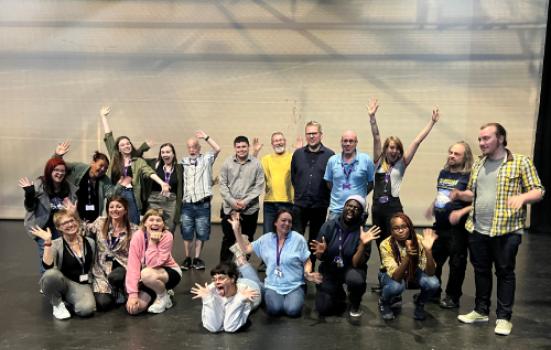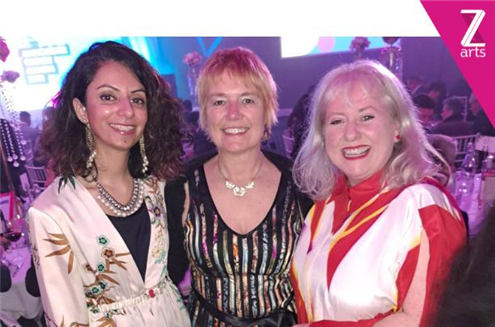

03/04/2023
Liz - Z-arts
Diversifying the Board at Z-Arts
 Z-arts Pilot Programme
Z-arts Pilot Programme
When the term of our chair at Z-arts was coming up for renewal, it seemed the perfect opportunity to address the lack of diverse leadership – as much a problem for our grassroots, inner city Manchester arts centre as across the country.
A nine-month chair development programme supported five trustees from backgrounds currently under-represented at board level to build their readiness to take on the role of chair. Participating trustees identified as members of one or more of the following communities: working class, global majority, young people, care-experienced and LGBTQ+.
Designing the Pilot Programme
As there is no template for this work, we started with a blank sheet. Each of the participants completed a baseline questionnaire on their readiness to take on such a role, what they wanted from the programme and their expectations.
Participants then proposed areas they wanted to explore. As well as increasing general knowledge and confidence, the key areas for development they cited were:
- Legal responsibilities and formalities (motions, elections, approvals, meetings)
- The difference between trustee and a chair
- Advice for being a chair alongside full-time work
- Relationships between chairs, executive and staff
- Leadership styles across different organisations
- Transferable skills: strategic thinking, techniques for difficult conversations, communication skills, people skills, management of processes and people.
The Programme
All participants had busy lives and full-time jobs, so to make it as accessible as possible the programme was designed to include a mix of self-paced online learning, online shadowing, face-to-face mentoring, attendance at training courses and an online conference.
We estimated trustees would need to commit to 50-60 hours over nine months – a considerable commitment. All participants were guaranteed an interview for the chair role.

The participants met chairs from other arts organisations, including HOME in Manchester and Exeter Northcott Theatre, gaining valuable insight into the variety of job descriptions, leadership styles and ways of chairing a board.
The participants virtually attended board meetings at ARC Stockton Arts Centre with the opportunity to question the board afterwards. ARC found the experience so valuable they asked to shadow one of our board meetings.
The group particularly valued sessions looking at leadership. Charles Lauder, former chair of Manchester’s Contact Theatre, mentored the group including running scenarios for discussion and offering a safe space for everyone to explore how they would lead as chair.
As well as the positives, there was some learning. For example, only one of the participants actually chaired a meeting and they wanted debriefs after meeting other chairs to discuss how they might transfer the ideas to our organisation. They also wanted more knowledge on the legal requirements on being a chair and of chairing an NPO.
The Appointment Process
The aim of the pilot programme was to upskill the group with knowledge and confidence to apply to become chair of Z-arts or another arts organisation. We expected some of them to apply for the role but anticipated having to run an open recruitment campaign alongside.
On reflection, we decided not to put out a public call out. We couldn’t imagine anyone else having such a wealth of fresh experience, combined with an existing knowledge of Z-arts.
An unexpected result of the process was reviewing different models of governance, such as co-chairs, vice or deputy chairs or even rolling appointments. We ran sessions with organisations using a co-chair model, discussing the pros and cons, and found this Pippa Warin article particularly useful.
During the interviews, run by a panel which included core funders from Arts Council England and the local authority alongside other trustees, we asked candidates which structure they were interested in pursuing (chair, co-chair, vice-chair, deputy, rolling chair).

Outcome and Benefits
By the end of the programme participants, some of whom had scored themselves as low as 5/10 on feeling equipped to becoming chair, all scored themselves 8 or 9 out of 10.
Our selected co-chairs, Nazma Noor and Lizi Ransome – a digital marketing manager and a secondary school drama teacher respectively, have complementary skillsets we believe will work well together.
The three other trustees who participated have stayed and are strong, vocal advocates of the new co-chairs. We hope they go on to apply for chairs of other arts organisations.
The most immediate benefit is that our new co-chairs are both passionate about and familiar with Z-arts, and are known to our team. Both are well-informed about the role and responsibilities of a chair, with up to date knowledge and fresh ideas.
We have also saved time and money on recruitment costs for an external chair, which are not inconsiderable. But most importantly, we have achieved what we set out to do, that is to strengthen our board and to make it more representative of our team, audiences and the people who live close to Z-arts.
Legacy
The legacy is that Z-arts now has inspired, knowledgeable co-chairs who are absolutely committed to the organisation, backed by a trustee team who work together more closely and share skills as a team.
The programme has bonded the participating five trustees more deeply than the usual ‘four board meetings a year’ format allows for. We are now looking to strengthen our entire board by offering appropriate development to all trustees. And we will be holding a session for all of the women at Z-arts about building confidence and banishing imposter syndrome. I can’t think of a more positive way to begin 2023.
Liz O’Neill is Chief Executive Officer and Artistic Director at Z-arts.
@Z_arts_mcr | @lizo_z
www.z-arts.com
